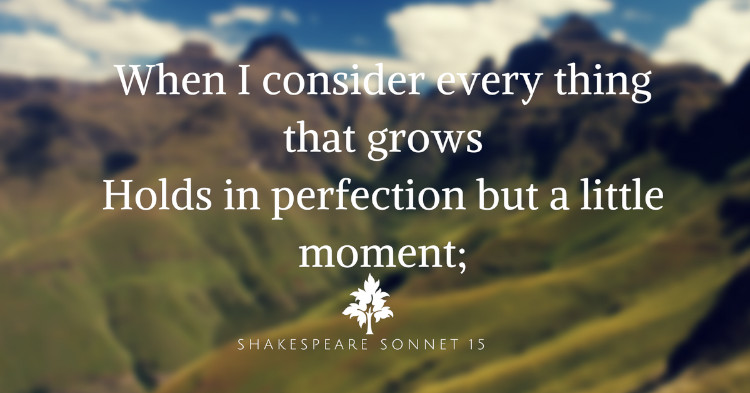Written by the most influential English poet, author, and novelist of all time, this sonnet is a fine work of William Shakespeare. Known as the national poet of England or ‘ Bard of Avon ‘( poet of Avon) because he was born in Avon, he has written around 154 sonnets, 39 plays, and 3 long verse poetry work. He primarily wrote most of his works between 1589 and 1630 which varied in different genres from historical to comedies and tragedies. His notable works include Hamlet, Macbeth, Romeo and Juliet, The Tempest, Othello, The Merchant of Venice, A Midsummer Night’s Dream, Twelfth Night, etc. His work has been translated into many languages and thus remains the most popular and irreplaceable part of English Literature.
Born to John Shakespeare and Mary Arden as the third of eight sons, Shakespeare attended the King Edward VI Grammar School in Stratford, where he learned Latin. He got married at the age of 18 to Anne Hathaway, who was 26 at that time. Together they had three children, two daughters, Susanna ( the eldest one) and Judith, and a son named Hamnet ( twin of Judith). However, Hamnet died at the age of 11 due to some unknown reasons.
Afterward, in 1576 he came in touch with James Burbage, a theatre owner, and thus started his journey as a theatre worker during his initial days. During this period, England was ruled by Queen Elizabeth. By the 1590s, theatres were established well, and acting and playmaking were worth paying jobs. Hence Shakespeare maintained his family well. He performed in Ben Johnson’s plays ‘ Every Man in His Humour ‘ and ‘Sejanus.’ He worked with the theatre called The Lord Chamberlain’s Men. He was also a shareholder there and thus received ten percent of all profits. Later on, The Lord Chamberlain’s Men received official status as the King’s Men in 1603 and received royal patent and protection. It’s been said that he lost his father in 1601, and in 1609 he moved to his hometown, where he resided until his death on 23 April 1616. He was buried in the chancel of the Holy Trinity Church two days after his death. His tomb’s epitaph read

“Good frend for Iesvs sake forbeare,
To digg the dvst encloased heare.
Bleste be yͤ man yͭ spares thes stones,
And cvrst be he yͭ moves my bones.”
Interpretation : Good friend, for Jesus’ sake forbear,
To dig the dust enclosed here.
Blessed be the man that spares these stones,
And cursed be he that moves my bones.
His wife, too, died in 1623 before seeing his First Folio edition of his works and was buried next to him.
It’s worth noteworthy that he never wrote to be read or studied but to be viewed on stage. His plays and poems passed many messages to his readers about humanism and secular views. We also see the impact of the Renaissance in his works. He stretched and touched the boundaries of literature with history, politics, as well as personal experiences of daily life very well.
That’s why one of his fellow authors said: “We wondered, Shakespeare, that thou went’st so soon / From the world’s stage to the grave’s tiring room.”
Analysis of Sonnet 15- When I Consider Everything that Grows
This poem is yet another work of the poet in Fair youth or the Procreation Series ( sonnet 1 to sonnet 17 ). Although there is no direct mention about procreation in this one particular when we see the intact summary of the poem, the poet here also reminds youth about his beauty and the effect that time is making on it. Hence the apparent theme of this sonnet is also procreation. However, one thing worth mentioning in this poem is the poet’s longing to preserve the beauty in the memories of his words.
The poem is written in a typical Shakespearean sonnet way that’s three quartets and one couplet. Just like other Shakespeare’s sonnets, this one also has a turning point or a change in the mood of the poet in the last doublet. Overall the poem is written in iambic pentameter with frequent use of simile, personification, and alliteration. The Rhyming scheme of the poem is ABAB CDCD EFEF GG.
Line by Line Summary of Sonnet 15- When I Consider Everything that Grows:
When I consider everything that grows
Holds in perfection but a little moment,
If you notice anything that grows or lives, you will surely find that they all had a moment of perfection in their life; that is, they all were very beautiful, young, and energetic at some point in their life. Be it flowers in their initial days of blossom or any human being in their youth.
That this huge stage presenteth nought but shows
Whereon the stars in secret influence comment;
This huge world where we live is a stage that presents nothing or is nothing; we all are somehow influenced by the stars, God, or fate. Here is the significance of the earlier belief of stars, or the celestial bodies controlling our fate or lives.
When I perceive that men as plants increase,
Cheered and check’d even by the selfsame sky,
The poet realizes that men and plats both grow and cherish under the same sun, moon, air, and sky. There is some sun providing energy to both plants as well as men and the same sky under which both plants and men bloom and prosper respectively. In these lines, we see the use of simile as the poet compares men with plants.
Vaunt in their youthful sap, at height decrease,
And wear their brave state out of memory;
Poet further says that every youth is proud and vaunted in their beauty. A sap for a flower or youth in a man’s life is the same. Both flower and man are proud when they are young and beautiful, but after reaching a height, or as time passes, this beauty, this passion, this energy degrades. This beauty and energy wears out or vanishes with time from memories.
Then the conceit of this inconstant stay
Sets you, most rich in youth, before my sight,
Therefore, my dear, I’m left here to think about the deception that this youth had done with you by staying for only a while. As a result, I consider that youth phase of your life the most bright one in my view, or I consider you were most rich, beautiful, and precious, like a star in my view when you were youth.
Where wasteful time debateth with decay,
To change your day of youth to a sullied night;
This useless time is always busy with destruction; it changes your days of beauty, youth, and hope into the sullied nights, the nights of no hope, no beauty that is his old age. Hence time always brings a decomposition of beauty and the brightness of days turns into the darkness of nights.
And all in war with time for the love of you,
As he takes from you, I engraft you new.
In these last two lines poet talks about the immortality that he’s going to provide to the youth’s beauty through his words. Poet sees the man fighting with time, and hence for the sake of love, the poet has for the beauty he wants to give youth what time is taking from him. He’s keeping youth’s beauty preserved in his words, in the form of these poetries. And thus poet makes youth’s beauty immortal.
Some online learning platforms provide certifications, while others are designed to simply grow your skills in your personal and professional life. Including Masterclass and Coursera, here are our recommendations for the best online learning platforms you can sign up for today.
The 7 Best Online Learning Platforms of 2022
- Best Overall: Coursera
- Best for Niche Topics: Udemy
- Best for Creative Fields: Skillshare
- Best for Celebrity Lessons: MasterClass
- Best for STEM: EdX
- Best for Career Building: Udacity
- Best for Data Learning: Pluralsight













